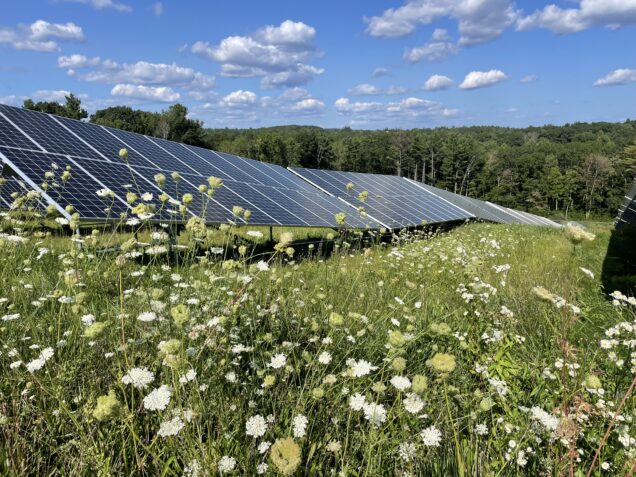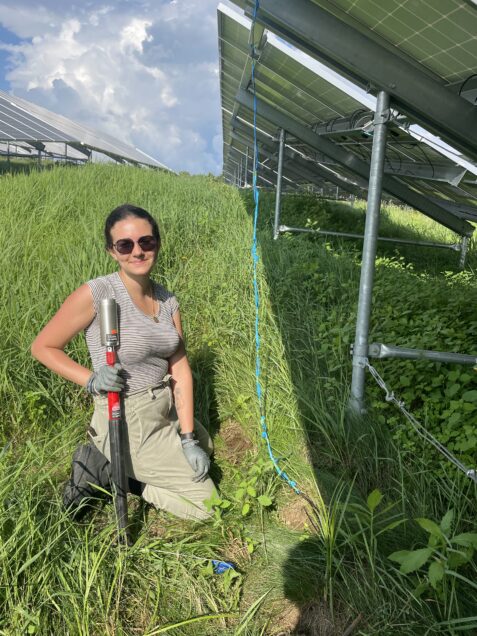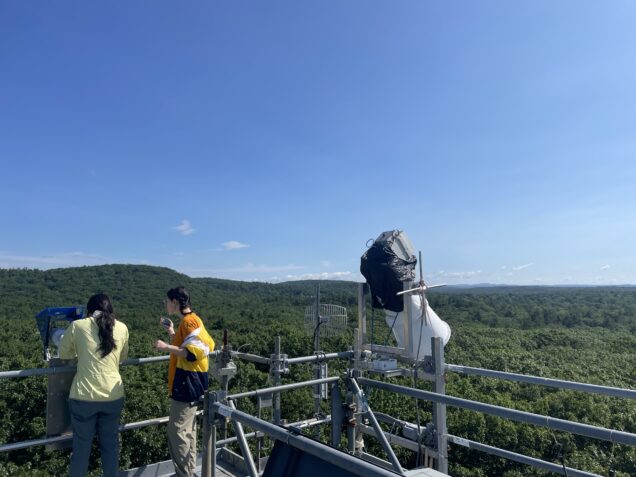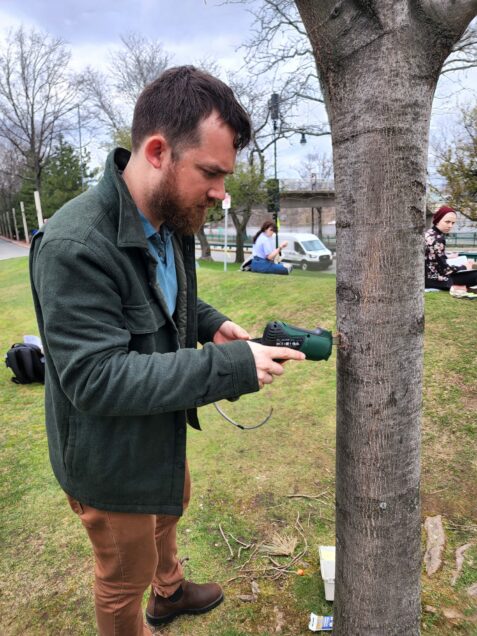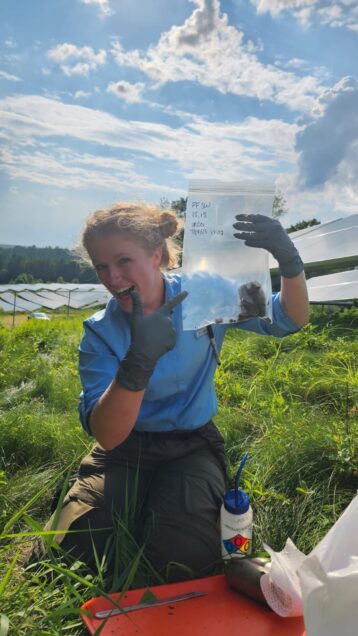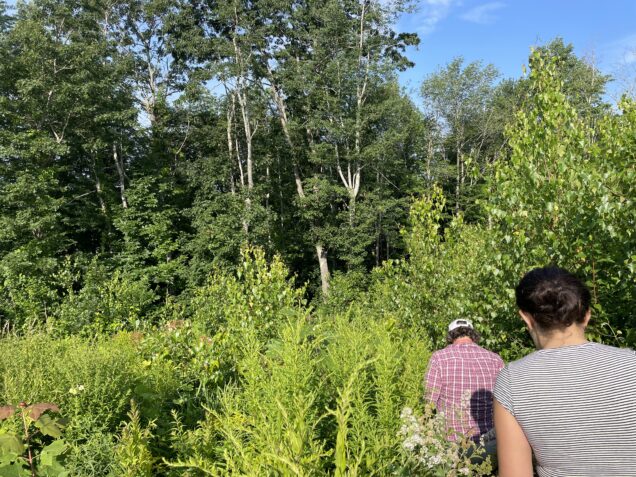Research Projects
Our lab’s work has been supported by a number of different funding sources, including the National Science Foundation, NASA, EPA, and the Environmental Defense Fund. Here are some current and past projects:
Current
- Gateway Exposome Coordinating Center (GECC) for Alzheimer’s Disease and Alzheimer’s Disease Related Dementia; NIH 2024-2029
- Modeling urban air temperature sensitivity to tree canopy expansion and cool roofs; World Resources Institute 2024-2026
- GeoCAFE – An RCN to Convene, Accelerate, Foster, and Expand Geosciences Research Addressing Climate Change Impacts on Human Health (C2H2); NSF 2024-2029
- Downscaling of OCO-2/3 Target Mode SIF and XCO2 Observations to Understand Fine-Scale Variability in Urban, Suburban, and Agricultural Areas; NASA 2024-2027
- From grasses to trees to forest fragments – Improving our understanding and modeling of biogenic fluxes in cities; NIST 2023-2026
Past Projects
- Application of continuous ground-based remote sensing to analysis of OCO-2/3 XCO2 and SIF data in mosaic landscapes; NASA 2021-2024
- Quantifying spatial and temporal variations in urban biogenic C fluxes: measurements, models and remote sensing from the leaf to the forest scale; NIST 2020-2024
- CO2-Air Quality Urban Synthesis and Analysis (“CO2-AQ USA”) Project: Trends & Drivers of Urban Emissions from Past, Present, to Future; NOAA 2020-2024
- Calibration & validation of XCO2 and SIF for urban targets; NASA 2019 – 2024
- PREEVENTS Track 2: Land-atmosphere feedbacks over urban terrain under heat waves; NSF
- LTER: From Microbes to Macrosystems: Understanding the response of ecological systems to global change drivers and their interactions; NSF, 2019-2024.
- NRT: Boston University – Partnering Graduate Students and Cities to Tackle Urban Environmental Challenges; NSF, 2017-2023.
- Understanding methane changes in cities affected by the COVID-19 shutdowns; NOAA 2021-2023
- A pantropical monitoring system of carbon emissions and removals from forest degradation, deforestation, and forest expansion and growth; NASA 2019-2022
- Fluorescence Based Constraints on Urban Biogenic CO2 Fluxes from OCO-2, OCO-3, and CLARS; NASA, 2018-2021.
- Calibration & validation of XCO2 and SIF for urban targets; NASA 2019-2020.
- CO2 Urban Synthesis and Analysis (“CO2-USA”) Network. ; NOAA, 2017-2021.
- Re-envisioning Urban Infrastructure to Address Climate Change: A Comprehensive Regional Framework for Sustainability; NSF 2019.
- Coastal Hypoxia Analysis and Risk Tracking (CHART) through Remote Sensing and Process-based Modeling in South and Southeast Asia; NASA, 2017-2020.
- Urban net ecosystem productivity: Solar induce fluorescence as a tool for productivity assessment; NIST, 2017-2020.
- Fragmentation effects on forest Productivity across managed ecosystem gradients; USDA, 2017-2021.
- Coupled Carbon and Nitrogen Cycling under Changing Land Cover and Air Quality: Improving Regional Estimates of Carbon Dynamics for the Northeastern U.S.; USDA, 2017-2021.
- RCN: Coordinating the Development of Terrestrial Lidar Scanning for Aboveground Biomass and Ecological Applications, National Science Foundation, 2015-2020.
- Re-envisioning Urban Infrastructure to Address Climate Change: A Comprehensive Regional Framework for Sustainability, (PI); NSF 2019.
- Vegetation Photosynthesis & Respiration Modeling for Toronto, (PI); Environment Canada, 2018-2019.
- Prototype Regional Carbon Monitoring Systems for Urban Regions, Thomas Nehrkorn (PI, AER), Lucy Hutyra, and Steven Wofsy (Harvard Univ.) Co-Investigators; Carbon Management System – National Aeronautics and Space Administration, 2016-2019.
- Tracking carbon emissions and removals by time series analysis of the land surface: prototype application in tropical MRV systems compliant with IPCC Tier 3; Pontus Olofsson (PI); Lucy Hutyra (CO-PI); Curtis Woodcock (CO-PI); Carbon Management System – NASA, 2016-2019.
- CAREER: Assessing urban influences on ecosystem processes; National Science Foundation, DEB-1149471, 2012 – 2018.
- Validation and Application of OCO-2 data in US Northeast Corridor, NASA, 2015-2018.
- Quantifying carbon signatures across urban-to-rural gradients: Advancing the capacity for monitoring, reporting, and verification through observations, models, and remote sensing; Carbon Cycle Science – NOAA, 2014-2017.
- SCOPE: A smart-city cloud-based platform and ecosystems; Partnerships for Innovation – National Science Foundation, 2014-2017.
- CNH-Ex: Shifting land use and forest conservation: Understanding the coupling of social and ecological processes along urban-to-rural gradients; Anne Short (PI); David Foster (Harvard Univ.), Lucy Hutyra, and David Kittredge (Univ. of MA-Amherst) Co-Investigators; Coupled Nation-Human Systems – National Science Foundation, 2012-2017.
- ULTRA-Ex: Metabolism of Boston; Nathan Phillips (PI); Joseph Ferriera (MIT), David Foster (Harvard Univ.), Mark Friedl, Peter Furth (Northeastern Univ.), Suchi Gopal, Lucy Hutyra, Robert Kauffman, and Steven Wofsy (Harvard Univ.) Co-Investigators; National Science Foundation; 2011-2013.
- 4-D Modeling of the Regional Carbon Cycle in and Around Urban Environments: An Interdisciplinary Study to Advance Observational and Modeling Foundations, Mark Friedl, (PI); Curtis Woodcock, Lucy Hutyra, Kelly Chance (Harvard-Smithsonian), Alison Dunn (Worcester State Univ.) and Steve Wofsy (Harvard Univ.) Co-Investigators; Interdisciplinary Research in Earth Sciences – National Aeronautics and Space Administration, 2012-2015.
- Prototype Monitoring, Reporting, and Verification System for the Regional Scale: The Boston-DC Corridor, Thomas Nehrkorn (PI, AER); Phil DeCola (Sigma Space), Lucy Hutyra, and Steven Wofsy (Harvard Univ.) Co-Investigators; Carbon Management System – National Aeronautics and Space Administration, 2013-2016.
- Methane Inputs from Natural Gas Infrastructure in Greater Metropolitan Boston; Robert Jackson (PI; Duke Univ.); Lucy Hutyra, Nathan Phillips, and Steven Wofsy (Harvard Univ.) Co-Investigators. Environmental Defense Fund; 2012-2013.
- Combating climate change through smarter urban transportation policies, IBM Smarter Cities Challenge for Boston, Lucy Hutyra (Academic PI), 2012.
- Estimating rates of methane leakage from Greater Metropolitan Boston; Nathan Phillips (PI); Lucy Hutyra and Steven Wofsy (Harvard Univ.) Co-Investigators; Environmental Defense Fund, 2012.
- Application of high-resolution physical and geostatistical models to define unresolved spatio-temporal variance in exposure of urban populations to traffic-derived pollutants; Steven Wofsy (PI; Harvard Univ.); Lucy Hutyra Co-Investigators; Harvard University, 2011-2012.
- Collaborative Research: Water and Carbon Dynamics in Tropical Peat Lands—Comparison of a Forested Peat Dome with a Deforested Peat Dome in Borneo, Charles Harvey (PI, MIT); Lucy Hutyra Co-Investigator; Hydrology – National Science Foundation, 2011-2015.
